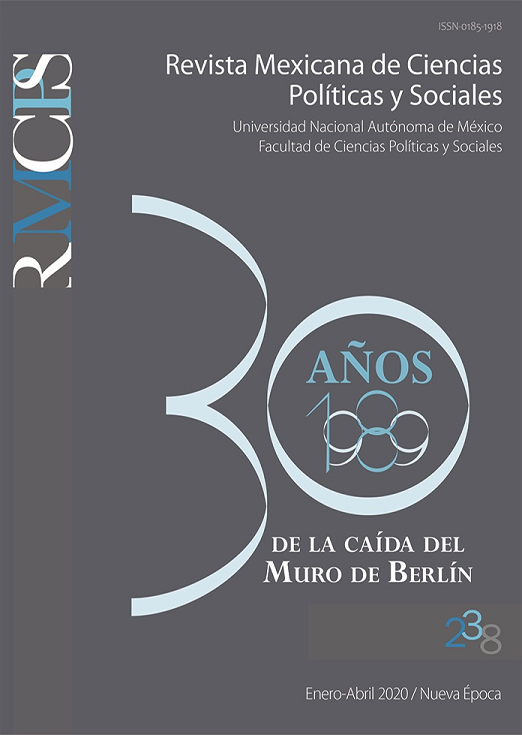The Old that Is Not Quite Dead and the New that Is Not Quite Born. Reflections on the World Order 30 Years after the Fall of the Berlin Wall
Main Article Content
Abstract
The dissolution of the bipolar architecture that prevailed in the international system from the end of World War II until the 1990s meant, for many, the possibility of transformation of the domination and control dynamics implemented all over the world by the two hegemonic powers. However, the deterioration of the power structures that for four decades had privileged the interests of the strongest countries and ignored those of the weakest did not entail the expected real change in international relations.
Although the end of the capitalism-socialism confrontation would allow the configuration ofnew geopolitical maps, along with a more inclusive international order, the hope that emerged after the fall of the Berlin Wall has faded over time, since the unjust power relations of that “old order” are still present in the “New World Order”.
Three decades after the collapse of Cold War, the hope of a more human and fair world is still a promise for millions of people in every corner of the world.
Downloads
Article Details
Citas en Dimensions Service
References
Bush, George W. (1989) Discurso sobre las relaciones entre Oriente y Occidente con motivo del “Día de gracias”, Camp David, Maryland, Estados Unidos, 23 de noviembre.
Bush, George W. (1991) Discurso pronunciado por George Bush, Congreso estadounidense, marzo.
Bush, George W. (1992) Discurso pronunciado por George Bush, 2 de septiembre.
Churchill, Winston (1946) “Discurso de Churchill en Fulton. 5 de marzo de 1946” Historiasiglo20.org [en línea]. Disponible en: http://www.historiasiglo20.org/TEXT/fulton-churchill.htm [Consultado en octubre de 2019].
FAO, FIDA, OMS, PMA Y UNICEF (2019) El estado de la seguridad alimentaria y la nutrición en el mundo. Protegerse frente a la desaceleración y el debilitamiento de la economía. Roma: FAO.
GHA (2018) Global Humanitarian Assistance Report. Reino Unido: Development Initiatives.
Oxfam (2019) ¿Bienestar público o beneficio privado? Reino Unido: Oxfam Internacional.
Rist, Gilbert (2002) El desarrollo: historia de una creencia occidental. Madrid: Catarata.
SIPRI (2018) SIPRI Yearbook 2018. World Armaments and Disarmament. Nueva York: Oxford University Press.
Stalin, Iósif (1946) “Stalin responde al discurso de Fulton de Churchill. 13 de marzo de 1946” Historiasiglo20.org [en línea]. Disponible en: http://www.historiasiglo20.org/TEXT/stalin1946-2.htm [Consultado en octubre de 2019].
Tuathail, Gearóid; Dalby, Simon y Paul Routlefge (2003) The Geopolitics Reader. Londres: Routledge.
UNCTAD (1997) Informe sobre el Comercio y el Desarrollo de 1997, vol. I. Ginebra: UNCTAD.
WHO (2019) Drinking-Water. Key Facts [en línea]. Disponible en: https://www.who.int/es/news-room/fact-sheets/detail/drinking-water [Consultado en octubre de 2019].

La Revista Mexicana de Ciencias Políticas y Sociales publicada por la Universidad Nacional Autónoma de México se distribuye bajo una Licencia Creative Commons Atribución-NoComercial-SinDerivar 4.0 Internacional.
Basada en una obra en http://www.revistas.unam.mx/index.php/rmcpys/
La RMCPyS autoriza a sus colaboradores que suban una copia de sus trabajos publicados en sus webs personales o en cualquier repositorio de acceso abierto, siempre y cuando se mencione específicamente a la Revista Mexicana de Ciencias Políticas y Sociales como fuente original de procedencia, citando el año y número del ejemplar respectivo y añadiendo el enlace a la página web donde este órgano editorial puede ser consultado in toto, de manera abierta y gratuita en: <www.revistas.unam.mx/index.php/rmcpys>.
Las y los lectores tienen libertad para:
Compartir, copiar y redistribuir el material en cualquier medio o formato.
El licenciante no puede revocar estas libertades en tanto usted siga los términos de la licencia.
De acuerdo con los siguientes términos:
- Atribución: la/el lector/a debe reconocer el crédito de una obra de manera adecuada, proporcionar un enlace a la licencia, e indicar si se han realizado cambios. Puede hacerlo en cualquier forma razonable, pero no de forma tal que sugiera que tiene el apoyo del licenciante o lo recibe por el uso que hace.
- No comercial: la/el lector/a no puede hacer uso del material con fines comerciales.
- Si se mezcla, transforma o se desarrolla a partir de la obra licenciada, no se permite la distribución del material modificado.
Cargos por gestión de artículos
La Revista Mexicana de Ciencias Políticas y Sociales NO cobra tarifas por recibir, procesar o publicar los artículos (Article Processing Charge [APC]) enviados por los autores.





